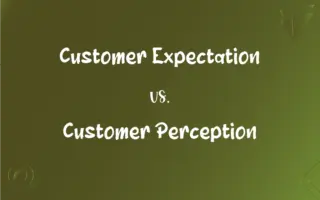Deception vs. Fraud: What's the Difference?
Edited by Harlon Moss || By Janet White || Published on December 23, 2023
Deception is the act of misleading or deceiving someone, while fraud involves deception for personal or financial gain.

Key Differences
Deception is a broad term encompassing any act that intentionally misleads or creates a false impression. Fraud, a subset of deception, specifically refers to deceptive practices for unlawful gain, often financial.
Deception can occur in various forms, like lying or withholding information, without necessarily having illegal motives. Fraud, however, always involves an element of illegality and is often associated with scams or embezzlement.
Deception can be non-malicious, such as in cases of white lies or fiction. Fraud, in contrast, is inherently malicious, aiming to exploit the deceived party for personal benefit.
The consequences of deception vary based on context and severity, and may not always lead to legal repercussions. Fraud, being a crime, leads to legal consequences, including fines or imprisonment.
All fraud is deception, not all deception amounts to fraud. The key distinction lies in the intent and outcome, especially regarding legality and personal gain.
ADVERTISEMENT
Comparison Chart
Intent
To mislead or create a false impression
To deceive for unlawful gain
Legal Implications
Not always illegal
Always involves illegal activities
Purpose
Can be harmless or malicious
Primarily for personal or financial gain
Consequences
Varies; not necessarily legal repercussions
Legal repercussions like fines or jail
Examples
White lies, exaggerations
Financial scams, identity theft
ADVERTISEMENT
Deception and Fraud Definitions
Deception
Art of misleading or presenting false information.
He used deception to avoid revealing the truth.
Fraud
Intentional perversion of truth for unfair advantage.
Committing fraud, she falsified her income tax returns.
Deception
Act of causing someone to accept as true what is false.
The magician's deception amazed the audience.
Fraud
A person or thing intended to deceive others.
The so-called expert was exposed as a fraud.
Deception
Misrepresentation or concealment in communication.
Her deception involved faking documents.
Fraud
Wrongful or criminal deception for financial gain.
The businessman was charged with fraud for embezzling funds.
Deception
The practice of tricking or cheating.
The game was won through clever deception.
Fraud
Deceptive action violating legal obligation.
His fraud involved selling fake insurance policies.
Deception
A strategy to mislead or delude.
The spy used deception to gather information.
Fraud
A scam or trickery, especially for money.
The email promising sudden wealth was a clear fraud.
Deception
The use of deceit.
Fraud
A deception practiced in order to induce another to give up possession of property or surrender a right.
Deception
The fact or state of being deceived.
Fraud
A piece of trickery; a trick.
Deception
A ruse; a trick.
Deception
An instance of actions and/or schemes fabricated to mislead someone into believing a lie or inaccuracy.
Deception
The act of deceiving or misleading.
Deception
The state of being deceived or misled.
There is one thing relating either to the action or enjoyments of man in which he is not liable to deception.
Deception
That which deceives or is intended to deceive; false representation; artifice; cheat; fraud.
There was of course room for vast deception.
Deception
A misleading falsehood
Deception
The act of deceiving
Deception
An illusory feat; considered magical by naive observers
FAQs
Can deception be harmless?
Yes, sometimes deception can be harmless, like in the case of white lies.
Is all deception illegal?
No, not all forms of deception are illegal.
What differentiates deception from fraud?
Fraud specifically involves deception for illegal gain, often financial.
Is fraud always related to money?
Mostly, but it can also involve other forms of valuable gain.
Is exaggeration a form of deception?
It can be, if it intentionally misleads someone.
What is deception?
Deception is misleading someone by hiding or distorting the truth.
Can a legal action be fraudulent?
Yes, if it involves deception or misrepresentation for unlawful gain.
Are all fraudulent acts deceptive?
Yes, fraud always involves some form of deception.
Can deception be non-verbal?
Yes, deception can be non-verbal, like through body language or actions.
What are the consequences of fraud?
Legal action, fines, or imprisonment.
What are common forms of fraud?
Common forms include financial scams, identity theft, and insurance fraud.
How is fraud detected?
Through investigation, audits, and sometimes whistleblowers.
How can one protect against fraud?
By being vigilant, verifying information, and not sharing personal data recklessly.
Are all fraudulent actions planned?
Most are, but some can be opportunistic or unplanned.
Are lies always considered deception?
Generally, yes, lies are a common form of deception.
What motivates people to commit fraud?
Motivations include financial gain, avoiding penalties, or personal advantage.
Can deception be justified?
In some cases, like in protecting someone's feelings or in strategy games.
What role does intent play in fraud?
Intent is key; fraud involves intentional deception for gain.
How is deception perceived in society?
Generally negatively, but context and intent can influence perception.
Can a truthful statement be deceptive?
Yes, if it's presented in a way that intentionally misleads.
About Author
Written by
Janet WhiteJanet White has been an esteemed writer and blogger for Difference Wiki. Holding a Master's degree in Science and Medical Journalism from the prestigious Boston University, she has consistently demonstrated her expertise and passion for her field. When she's not immersed in her work, Janet relishes her time exercising, delving into a good book, and cherishing moments with friends and family.
Edited by
Harlon MossHarlon is a seasoned quality moderator and accomplished content writer for Difference Wiki. An alumnus of the prestigious University of California, he earned his degree in Computer Science. Leveraging his academic background, Harlon brings a meticulous and informed perspective to his work, ensuring content accuracy and excellence.































































